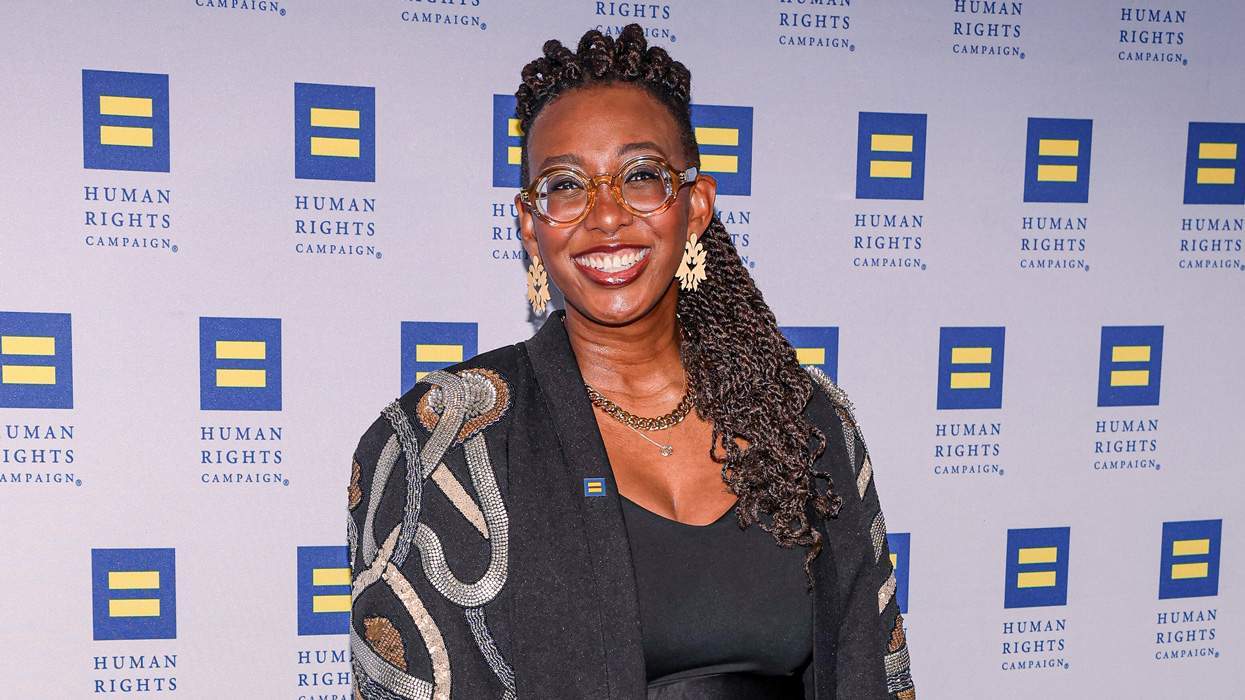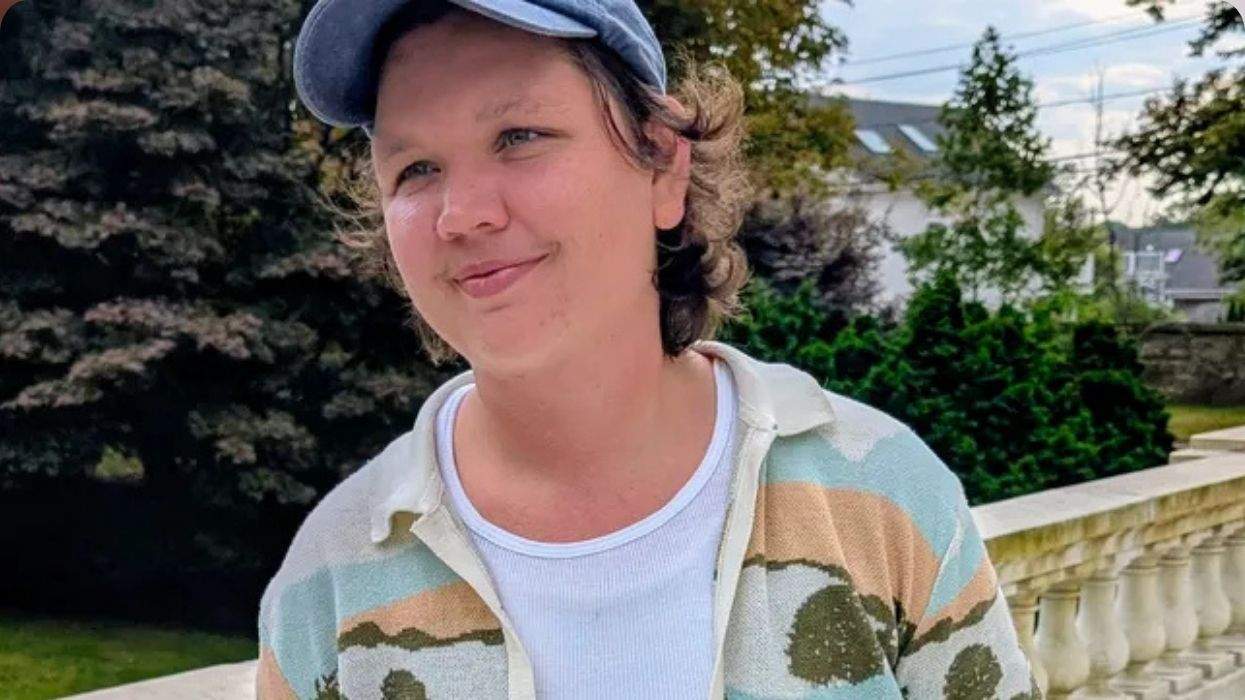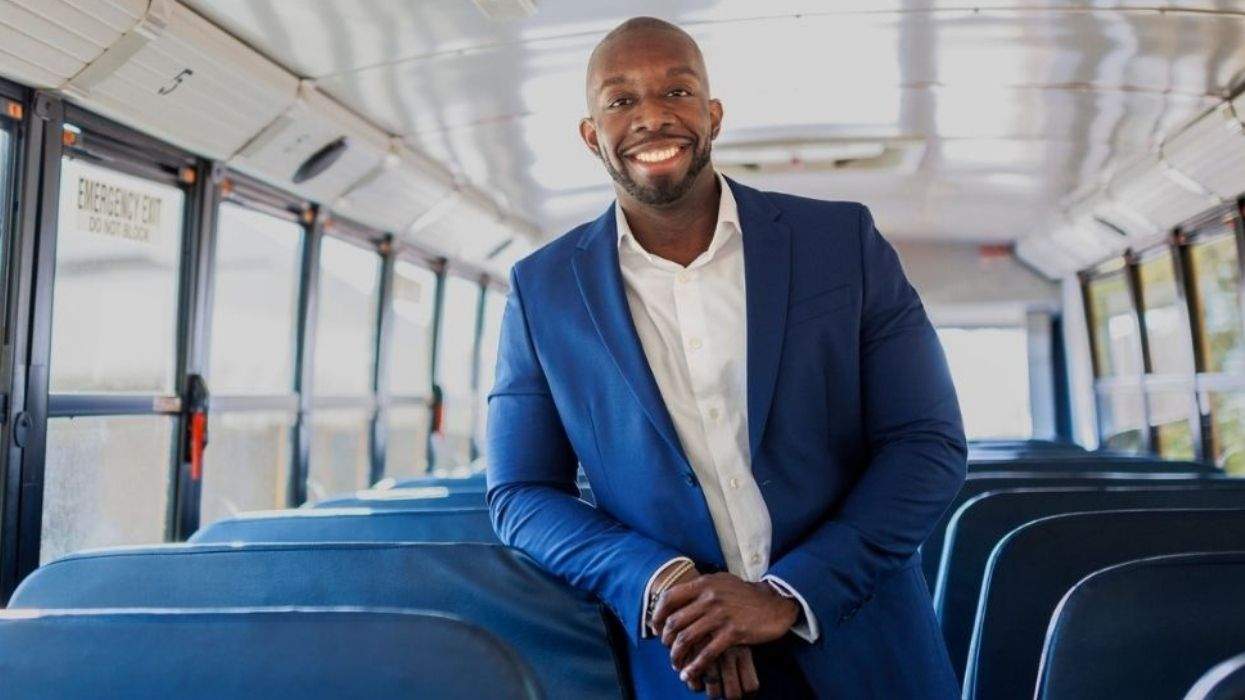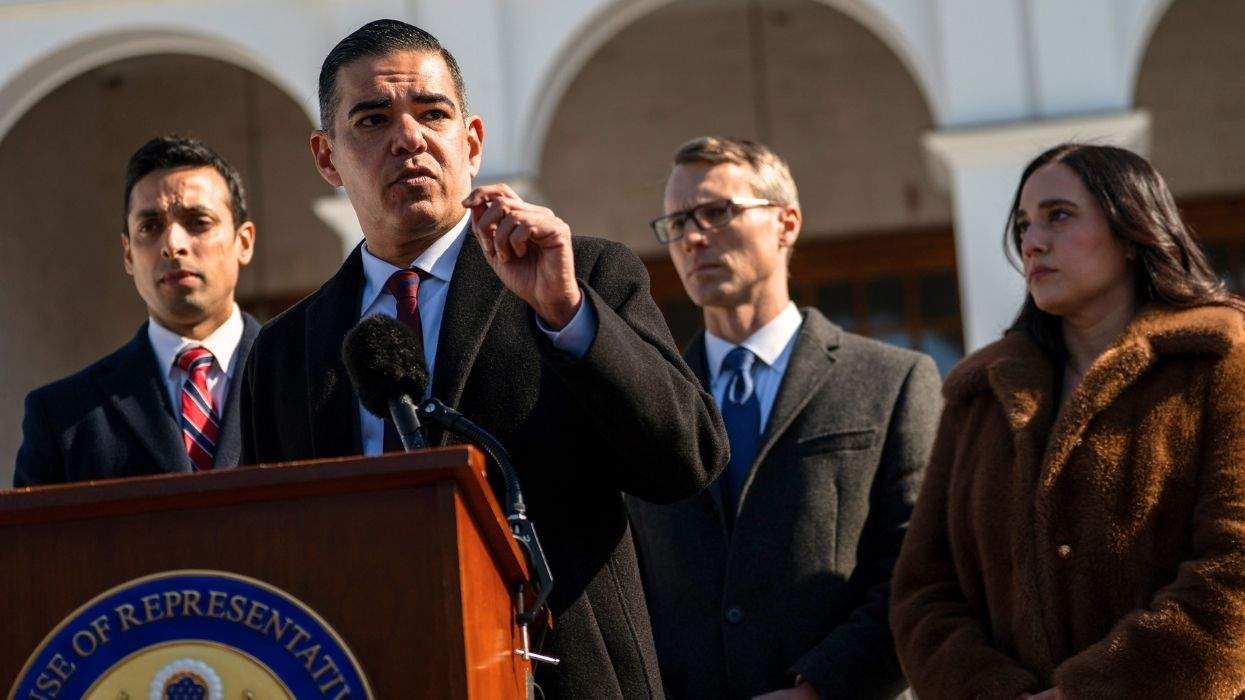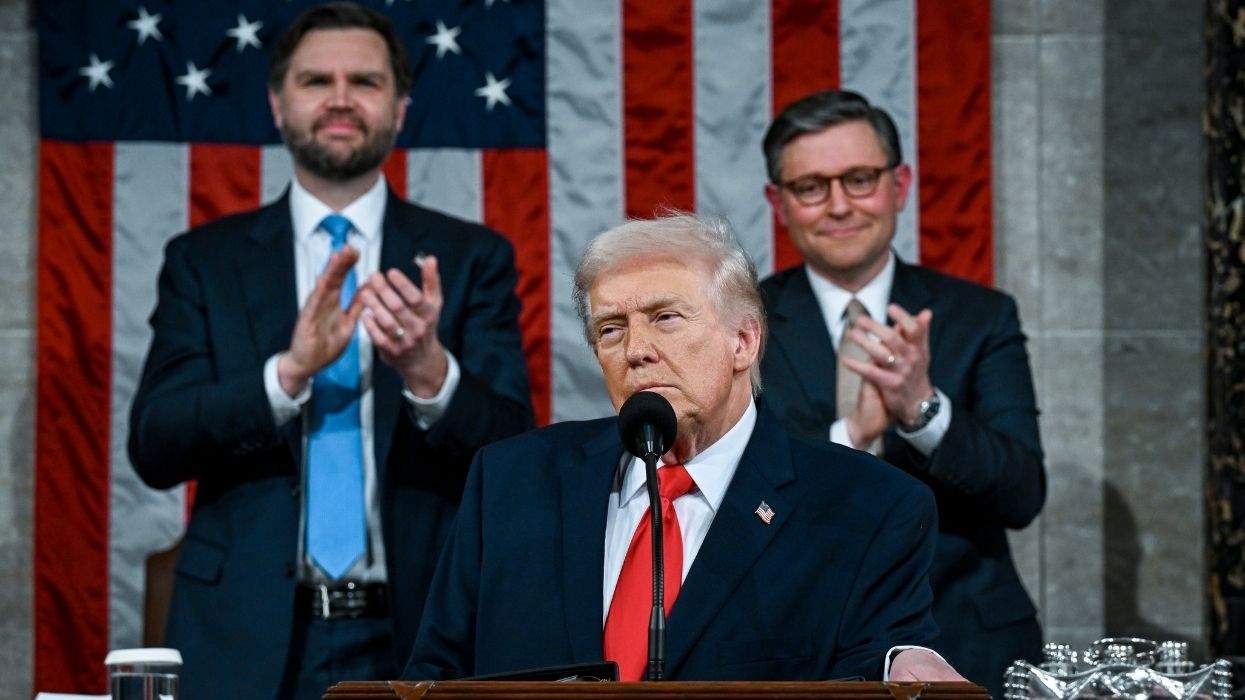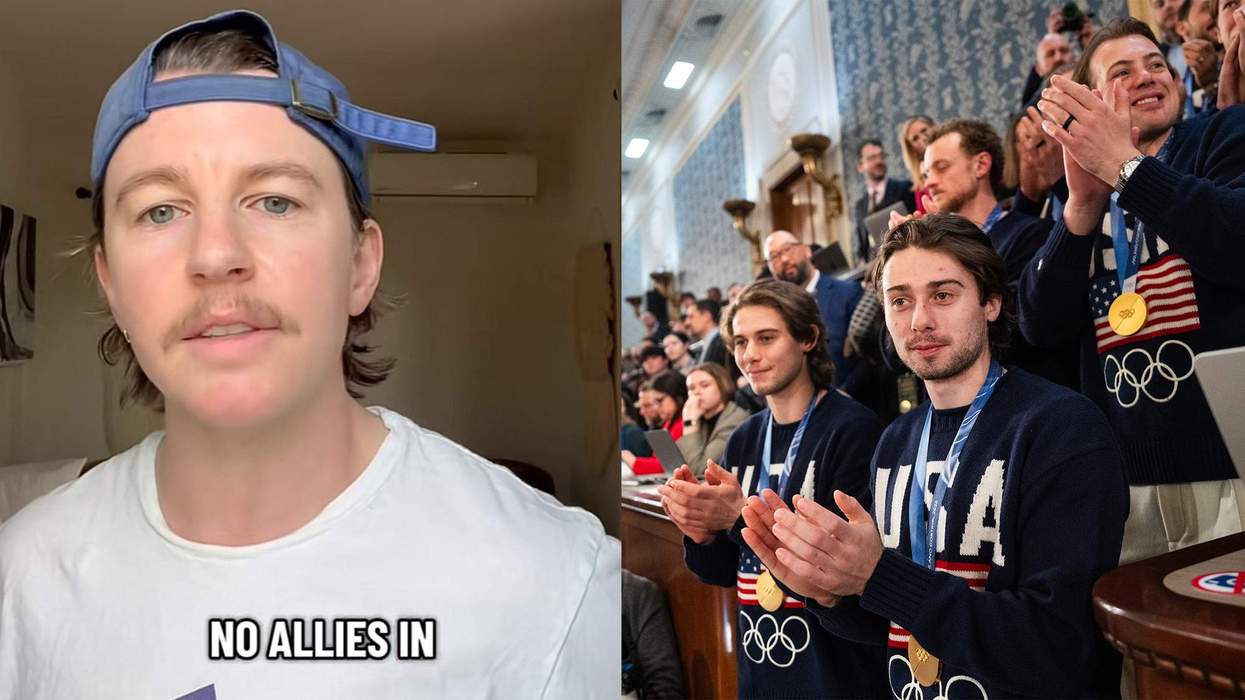We're 15 minutes out from the start of The Ellen DeGeneres Show, and the studio audience is already on its feet and dancing. Practically speaking, we don't have a choice: Nobody could resist the beat of the vintage funk music pounding through the warm blond-wood-and-aqua set. Besides, it's fun. Other live shows push their audiences to compete aggressively for souvenirs, but here, in NBC's Studio 11 in Burbank, Calif., guests are told they'll get an "I danced with Ellen" T-shirt not for having danced best but for having the best time while dancing. By the time DeGeneres bounds onto the set in slacks, blazer, and running shoes, she's the last to arrive at her own party. And are they ever thrilled to see her. Their roar of affection fascinates particularly because there's no way this far-flung crowd is all gay-friendly all the time. Yet confronted with one of America's most famous lesbians ever, everybody greets her as one of their own. At 46, DeGeneres is living proof that you can actually come to the end of coming out. More than perhaps any other public figure, she has run the whole gauntlet--professional setbacks; her own public growing pains; the humiliation of being written off by colleagues, pundits, and a lot of lesbians and gays as well. Now DeGeneres is on the other side. Honors and endorsements are rolling in. She's slated to speak at one of Harvard Law School's commencement events in 2005. She's featured in a new global ad campaign for American Express alongside other highly individual stars like Robert De Niro, Tiger Woods, and surfer Laird Hamilton. More than all that, in terms of her own talent, DeGeneres is apparently just getting warmed up. After decades of success in sitcoms, it turns out she's equally gifted at hosting a cavalcade of celebrities and coming up with offbeat ways to let them shine. A good example: When the famously foulmouthed Colin Farrell did the show, every curse word was drowned in the studio by the sound of a mighty ka-CHING. Farrell and DeGeneres had agreed that he'd be fined $100 per profanity, with the take to go to charity. The shtick worked brilliantly, granting Farrell his edge but softening it too. Just as clever was a good-humored sketch in which Farrell and Ellen fell into a passionate kiss backstage and he sobbed brokenheartedly once she was gone. The audience, feeling in on the joke, loved it. With this show, DeGeneres has found the Goldilocks zone: not too sweet, not too sharp, but just right. Of course, finding that zone keeps her on a day-in, day-out treadmill she describes as "insane." "Ellen's running a marathon," acknowledges photographer Alexandra Hedison, DeGeneres's partner of nearly four years. How does that marathon unfold each day? The Advocate asked Hedison to give us an idea by shooting one day in the life of her significant other. What follows is a rare personal glimpse of the woman whose comedy was one of the few things to unite Americans in 2004. This year we all danced with Ellen. In case you didn't notice, she led. Did you always know your show would be such a smashing success? No. I thought I'd be good at it. I didn't know how hard daytime was; I didn't realize how competitive it was, that there's a pecking order, until you establish yourself and your ratings are at a certain point, that a guest has to go on this show first, then that show, then that show--all these different games that people play of "You can't have this person until they appear on this show," and that kind of sucks. I didn't realize the amount of content that you have to come up with every single day. I mean, we've done, like, 140 shows. That's incredible. I know. It's 140 monologues, 140 days walking out and having something to talk about, 140 times that I've had to stay completely present with somebody and not drift off no matter how tired I am. It's really an intense amount of energy to expend every day. I'm finding ways of keeping that energy level up, because it's really hard. But I'm pleasantly surprised. And now it feels like there's very little that could really happen that could hurt us. We're in good shape now. So you've come up a lot in the guest pecking order, I'm sure. Yeah, but...it doesn't matter to me; I don't care if I'm having them after every single person or that they've been on everything. I know I'm gonna do something different with them. And that's the whole point of the show, so that people who are watching will go, "I've seen them on every interview, but I know when they're on Ellen's show, I'm going to see something different than I would see on anywhere else." Who's helping you come up with the monologues every day? I have writers. And I come in--sometimes I have something to say, sometimes I've given them ideas. I'll just come in some days--like today I'm talking about relaxing and different ways that you can relax--I told them last week, "Come up with a monologue for that." Yesterday I had no idea what I was talking about. [Anne laughs] Oh, public speaking. I make sure that they have something every single day, and then they come in and we either write it together--we just pitch ideas or they've written it after we've pitched ideas, and then I rewrite it with them. It's a collaboration. Do you get any time to yourself? During the day? No. Literally from the moment I get here, there are probably 30 things I talk to Craig, my assistant, about--making decisions. I had radio interviews this morning when I first came in, then the writers come in, and then the segment producers come in and we go over the questions for the guests of the day, and I rewrite things that I don't think I want to talk about and change things. Then I usually have an interview--something like this--and then I go down and rehearse, then we rewrite things, then I get hair and makeup. I've never had so much power over a show. I mean, I guess I did with my sitcoms, but I didn't care about it. I was like, "I don't care about the set; I don't care about the color of the walls." But I make every single decision on this show. I have executive producers, but it comes down to coming up to me and saying, "Here's the option: We do this or we do this." It's probably 70 to 100 decisions a day. Every day. That's grueling. It's insane. And then it starts over the next day. I've never been so involved in every aspect. We just got back from New York--we went to New York to do that RSVP Suite. I did something with Donald Trump, I did something for American Express, I did the Today show. I did something every day from 6 a.m. until about 8 o'clock at night for four days. And then I got on a plane and came back and started yesterday. Can you ever have a sick day? No. Last year I got sick--you get sick a lot on this show, because you're shaking a lot of hands and there's a lot of contact--and I talk about everything that's going on with me; I never try to pretend like something isn't going on. [Last year] I walked out and I would say, "I'm sick," and I would talk about being sick and the cold medicine and how it makes you feel. You can just feel the audience kind of [makes a downward gesture]...They don't want me to be sick. If I'm down, they're down. So even if I'm sick, I gotta be up, because it's up to me to keep that energy going.
What a great year you've had--that was going to be the whole subject, and then the election happened. Were you surprised by all that? I feel like things sometimes have to swing a certain way in order to swing back. You know, everybody has gone through this. Every group of people that has been discriminated has gone against these times, and it'll be fine. You can't think anything else, or else you're doomed. I do believe that things will swing back and that even conservative people will think this has gone too far now. All I can think about is what I do, which is make people happy and forget about all that stuff. Then people that do that for a living--activists and politicians--are gonna keep fighting, and I can keep being a representative of what is supposedly not normal and try to remind people that we are normal.
We're both from the heart of the red states, where gay marriage was such an election issue. So many gay people had their families, in effect, vote against them. Would you have anything to say to families like that? [Pauses] I think in a way, they're not really clearly understanding that it's a big deal. I think they're trying to protect [against] something that they fear. I think anybody who is going to that length, to vote on some kind of measure to exclude rights from people, is acting out of fear. I don't know that I'm the person--or anybody--who is going to be able to [change anyone's mind]. I think it's a matter of realizing that it's just about having equal rights. It's not about having special rights, it's about equal rights. Is getting married important to you? No. I've never had that desire to stand in front of a bunch of people and say, "This is how I feel--everybody needs to know this." I feel, if something happens to me, that Alex would be protected financially. We've gone to lengths where we've had to pay an attorney money that married people don't have to, to come in and set up certain rights so that if I'm in the hospital, she has the right to be in there and make decisions for me. But not everybody can afford to go to that length. I've heard you say in interviews that, because you're seen as such a hero, people get reverent with you. That could be a drag sometimes. You know, I was talking about this with Alex the other day. I guess it's just hard for me to understand because it's my life and it's just who I am, but I understand the impact that it's had on other people. I have to appreciate that, and I shouldn't push it aside. That's why when people applaud when I walk out there, as much as I know people at home are going, "That's enough--we're at home, we don't need to hear the applause that long," if people feel like whooing, I'm gonna let 'em whoo. [Anne laughs] How often in a day do you feel like whooing? I want people to feel how they feel. What I don't want people to feel is less than. In 2000, I was in the audience at the Concert for Equality in Washington, D.C., when you got the longest standing ovation I've ever heard. You'd had such a difficult year. But then came that unbelievable ovation. What was that like from your end? It was wild. It was wild. Does that ever come back to you in your mind? No, not until you just said that. I try not to hold on. I don't know if I try not to; I just don't hold on to stuff. Things happen, and it's all part of this puzzle that keeps making me, and I try to figure out who I am by all these little pieces. That was definitely a moment that was just so emotional. It was pretty cool. I want to ask about this genius you have: When somebody says something, you instantly know what to say back. It's not quick; it's instant. Do you see that comeback in your mind? Is there a sensation that comes to you? There's a sensation after it comes out of my mouth, like, Oh, that was good. [Anne laughs] I mean, seriously, that's not any controlled...it's not me. Everybody's born with different talents: somebody who can dance really well or play sports really well--that perfect basketball shot where there's just all net... That sweet spot. Yes, and that's how I feel. If you know what hitting that sweet spot feels like when you hit a golf ball, that's what it feels like when something comes out of my mouth that fast. Sometimes I think of something when somebody's talking and it takes me a few seconds, and by that time they're starting to talk about something else and I have to let it go. And I'm so mad at myself, because had I been two seconds earlier, I would've had a great response. But it's more important to let the person talk, because it's not about me, it's about showing them in their best light. And some days I'm quicker than others. It's like anybody, whatever you do: There are days that I'm fast, and there are days where I'm really, really funny, and then there are days where I'm not funny. I don't try to be funny when I'm not funny, because I think that's really annoying. That's smart. It's just, people that are on all the time--and I know people that are really funny people--after a while, when it doesn't ever turn off, it's like anything. You're like, "OK, that's... [mimes fatigue] funny." You just can't laugh after a while. Sometimes I get people trying harder to be funny around me too, to show me that they're funny so that I'll somehow bond with them. And that's hard, 'cause you can feel when somebody's trying, you can feel when it's forced. The things you can say as a stand-up in a club are very different than what you can say on your show. Are you eventually going to write a book including everything you would've said on the show but couldn't because it was daytime, because it was nice? No, this is really my humor, this is really who I am. I'm not censoring myself. I think that's the misconception with me--and that was the problem with me getting the show in daytime. "She's gonna have to be different, 'cause it's daytime." If I had a nighttime slot, I would have the same exact show that I have right now. If I do have a thought of something that would be kind of off-color, it's really just like those inside thoughts that anybody would have. When those things happen, I don't say anything, and then the audience laughs with me--everybody's thinking the same thing. Yesterday, Ashley Judd was on, and I said, "Is your husband here?" She said, "He's shopping today--here I am working, and he's shopping. We're big into role reversal in our marriage." I was like, "Please tell us about that." Because you're not going to ignore the fact that she's talking about role reversal in their marriage. Then it just was a laugh and we went on. Elton John was on with you on Monday. Do you two ever play off the fact that you're both famous gay people? No. I don't live my life like...I'm not even aware that I'm famous until people remind me. I wake up every single day and I have my life, and it's pretty normal. I drive myself to work, I don't get driven to work; I don't have a chef that makes me breakfast in the morning. I don't think that I'm famous until I come here and it's like, Oh, that's right. Even then, this is my job. And I don't think, I'm going home to my girlfriend and I'm gay. That's my life, that's who I love, my girlfriend and I are in love, but I don't think, I'm going home to my gay girlfriend. And I don't think, Oh, that's right, Elton's gay and I'm gay and we're together. To me, that is a problem, when there is too much emphasis. Also, it's not making steps forward. It's continuing to say "us and them." And I don't think it is "us and them." Well, it doesn't make sense. There was a time when people were saying I was not gay enough, that I wasn't doing enough and I wasn't an activist, and then straight people were saying, "She's too gay." Any time you start pointing the finger and judging somebody else, then you have no right to get mad at them for judging you, because they feel just as strongly as you feel. It may not feel good to you, but they have that right. A lot of us think of you as--I hate the term role model--as our visible person, I guess. You went through the fire of coming out in front of the world. And now you're at the place where so many of us would like to be. Everybody knows it's you and Alex; they know you're gay. But it's not the first thing they think of. Have you outlasted your own coming out? Are you past the worst of it? Oh, yeah. I mean, the worst of it really was--I don't feel like [my past relationship] needs to be mentioned in every single thing that I do, but unfortunately, that is what contributed to this whole thing. And it is one of those pieces that was necessary to me--a huge amount of growth. Huge. I'm grateful for that relationship, I'm grateful for all of it, because I look at that and I go, What made me that person that allowed all that to happen? It's hard to say what caused the fire that I went through, as you say. But whatever it was, it was all good and all necessary, because it's even sweeter where I am now. I believe you. I worked really, really hard for my career up until that point. I made a decision to come out because it was the right thing for my soul, for me as a person, and I realized that it was more important to fully embrace and not to feel one ounce of shame about myself. Up until you make that decision, you can tell yourself all you want that it's nobody's business and it has nothing to do with anything--[but] it has everything to do with everything. Once you embrace it, then it's got nothing to do with anything. It's so hard to see until you're through it. It's huge, huge...like you're carrying around a piano on your back and you don't even know it until you say, "Wow, this is who I am and I'm not gonna hide it anymore and I'm not gonna feel shame about it and I'm not gonna worry if people hate me or think I'm a freak or think I'm gonna lose my career." It's so much stuff you're carrying around attached to that one tiny thing. And then once you do it-- [Smiles] For me, when people go, "Do you hide the fact that you're gay on the show?" or "Do you worry about that?" I don't even think about that. But I used to think about it all the time, because I was making sure that Ooh, if I say this, will they know that I'm gay? What if I do this? What if I slightly look at a girl? You can't possibly be the best person you are at whatever it is, because you're hiding. You're a little perpetual self-checking machine, and that's all you are. Now it's got nothing to do with anything. I allow anything to be said [and don't worry about] anything that I say, because I'm not scared of anything anymore. Let's talk about Oh, God! which you're planning to remake in 2005 with yourself as God. Your comedy has touched on God before. In fact, the routine that got you started was called "Phone Call to God." But I'd have thought that if you were going to remake this film, you'd have put yourself in the John Denver role. Why's that? Because that seems to be your comedy persona. Not the person who's in charge, but the person who's tentative, who's feeling her way. That's what's going to be different about this movie. We assume that God is completely in control of everything. That's a really easy way to not take responsibility, to go, "Well, God wants it this way" and "God planned it this way." How do we know that? Maybe God's going, "Oh, that's not what I meant." I get it. That's interesting. If we're created in God's image and likeness, supposedly, then there are mistakes; there's humor. We're still writing [the film] right now. It may leave you questioning, "Do things happen for a reason? Are things all planned out? Or are things all up to us, and we do with them what we will?" What do you think? We make our choices, because--I think everybody can relate to this--no matter how many times you keep being somehow herded [away from] one direction, you just ignore it and keep going back to that direction, whether it's a bad relationship or the same kind of person that screws you over every single time and you think, It's gonna be different this time. So the question is-- If there's something that is the higher intelligence, the higher power, why would something that powerful and that intelligent not give us that same intelligence? Why would something with that intelligence say, "I'm gonna be just a little bit smarter because I have ego"? That's what we would do. So why wouldn't something that's all love and all giving not give equally to everybody? God, obviously, is a hot topic in America right now. Do you think some people might prefer not to see God played by someone who's gay? Oh, I'm sure that when George Burns did it, they were upset that a Jewish man was playing God. That was a problem. But, listen, I'm not making The Passion of the Christ, I'm not making a political movie, I'm making a comedy. Warner Bros. is full steam ahead--we're making the movie. If it gets some people upset, they should come see the movie and see what they're upset about before [judging], because it's insane. I also played a fish, and I wasn't a fish. True. There will be things said [in the film] that I believe in, because it's what I do, even though my comedy is not political. When I do "Phone Call to God," or when I go to God's house to visit [in 2003's Here and Now], I always slip something in there that I care about. When I was doing the visit to God and saying, "I'm sorry that we're chopping the trees down, I'm sorry we're killing each other, I'm sorry we call each other names," there's always a punch line at the end of it. When I ask God what the hardest thing about being God is, and God says, "Trusting people--you never know if people really like you, or if it's just 'cause you're God." That's true. You've had a lot of experience with that, haven't you? Yeah. Right. So wouldn't God have the same problem? It's a comedy, yet it's all stuff that, I hope, will make you think. In "Phone Call to God," you asked God, "Why are there fleas?" Have you figured that out yet? [In "Phone Call"] God says, "There are people employed by the flea- collar industry," which is true. [Pause] And the sprays. [Anne laughs] But that's why the environment is so important. You take one thing away, and something else isn't eating. And if that isn't eating, then something else isn't eating. And it all ends up with us. We're all part of this huge ecosystem, and we all need every single thing here. It's not like we can possibly go, "Well, we don't need that anymore." We do. It's all imbalanced because we're making it imbalanced. Fleas are as important as the gorilla or the horse or the fish or everything else that we're destroying. In this photo essay, what do you think people are going to be surprised to find out about your daily life when they see these pictures? How boring it is. They'll be like, "Oh, man, this is a disappointment--I want my money back!"

